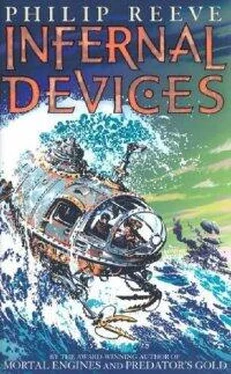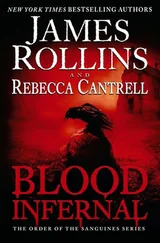In the belly of the Requiem Vortex, Grike checked on Oenone Zero and found her in her cabin, trying on a steel helmet that made her look even younger and less soldierly than before. Her cowardice perplexed him. He had been sure that she would try to attack the Stalker Fang before the fleet reached its target. Had she given up her plan? Perhaps; he had searched her cabin several times and found no sign of any weapon.
Sirens were hooting. The ship’s companionways and passages were full of frightened Once-Borns and impassive battle-Stalkers hurrying to their posts. Grike made his way to the forward gondola and found his mistress there, ignoring the crew, staring out instead at the enormous moon.
“why are we here?” Grike asked.
The Stalker Fang’s bronze death mask turned to stare at him. She had still told no one the reason for this expedition, and Grike suspected that if any of the Once-Borns, even Naga, had asked her so bluntly, she would have torn his throat out with her claws for their impertinence. But she only stared at Grike, and then whispered, “Tell me, Mr. Grike, do you ever remember your former life? Your life as a Once-Born?”
“i do not even remember my life as a stalker,” said Grike. (Although a memory flared up as he spoke: a young girl with a bloody face lying on a heap of old cork fishing floats. He squashed it quickly, like a man stamping on a flame.) “I remember nothing before dr. zero awakened me on the black island.”
Fang turned away, looking out through the glass again, but he could see the reflection of her face, the odd marsh-gas flaring of her green eyes. “I remembered something once,” she said. “Or I almost did. There was a young man I encountered at Rogues’ Roost. Tom. When I saw him, I felt that I knew him. He was very handsome. Very kind. Anna Fang must have been fond of him. I am not Anna Fang, but when I looked at him I sensed… oh, all sorts of intriguing feelings.”
“we are the dead,” said Grike, who was starting to grow uncomfortable. “we do not feel. we do not remember. we were built to kill. what use are memories?”
“Who knows what the first of our kind were built for, back in the Black Centuries?” asked the other Stalker. “My memories are what have brought us here, Mr. Grike. I made inquiries about this Tom. I wished to learn more about him, and perhaps to recapture those strange sensations. I found out that he and his companions had a connection with an ice city called Anchorage, so I sent to the Great Library of Tienjing for books on Anchorage. They had only one: Wormwold’s Historia Anchoragia. It told me nothing about Tom, but it was there that I first learned of the Tin Book and guessed what it contains.
“what IS the tin book?” asked Grike.
“The Tin Book?” The Stalker looked playfully at him, her head on one side, a finger to her lips. “The Tin Book is what we are here for, Mr. Grike.”
Hester too had been waiting for the moon. Perched on a seat on the lower-tier promenade, she had whiled away the time by glancing through her copy of Predator’s Gold, and what she had found there cheered her. It seemed to her that Pennyroyal had buried the truth beneath so many lies that nobody would ever be able to unearth it.
At moonrise, as the rowdy crowds flooded out of Brighton’s underdecks to watch the fireworks, she shoved her way past them, pushing against the tide into the district of dank slave barracks and tenements called Mole’s Combe. By the time she reached the foot of Shkin’s tower, the streets around her were deserted except for the seagulls, which, startled from their roosts by the racket on the promenades, soared like white phantoms beneath the web of peeling girders overhead.
She had studied the Pepperpot earlier, and decided on a way in. Round on the sternward side, surrounded by bins and fat, snaky ducts, was a small back door made of rusty metal and studded with rivets like the hatch of a submarine. Above the door a spiffy brass security camera kept watch on visitors, but there were no other defenses; the Pepperpot had been designed to keep people in, not out.
Hester approached cautiously, keeping to the shadows. Her heart beat fast. She imagined the blood rushing through her veins and arteries, filling her with her father’s cold strength. She felt that both Wren and Tom were very close, and that soon they would all be together again, and happy. Smiling to herself behind her veil, she pulled the Schadenfreude out from inside her coat and waited until the next fusillade of fireworks, then shot the camera off its mountings.
She had just enough time to stuff the gun away before the door opened and a man came out and stood with his hands on his hips, peering up indignantly at the smoldering wreckage of the camera.
“Happy MoonFest!” called Hester.
The man turned. He looked surprised to see the veiled woman walking toward him, and even more surprised when she shoved a knife between his ribs. He died very quickly, and she heaved his body into the shadows behind the bins and went through the door, closing it softly behind her. She found herself in a corridor. Light and voices came from a small guardroom. She peeked in. There were three more men inside. One was stabbing irritably at the buttons beneath a circular screen that fizzed with static; the others were slumped, bored and uncomfortable, on office chairs, drinks in their hands, wishing they could be with their wives and their children at the celebrations.
Hester shot the one at the screen first, and killed the others as they sprang up, groping for their guns. She stood quiet for a time in the shadows, waiting for someone to come. No one did. There were so many rockets and firecrackers being let off in the streets outside the Pepperpot tonight that a few extra bangs made no difference. She reloaded the Schadenfreude, noticing with pride that her hands hardly shook at all.
The Shkin Corporation was well organized, and she was glad of it. A framed plan on the guardroom wall showed her the layout of the place. She took a moment to memorize it; then, silent and sure of herself, she moved toward the slave pens. Two men stood watch outside a pair of heavy double doors. One lunged at Hester with some sort of electric cattle-prod thing, but she sidestepped him and stuck her knife in his back, then cut the throat of the other as he reached for the alarm bell. There was a ring of keys on the second one’s belt, and it did not take her long to find the one she needed.
The slave pens were filled with soft breathing and the faint stirrings of caged things. As she grew used to the dark, she started to make out the cages ranged around the walls, and the faces staring out at her through the bars.
“Tom?” she called.
All around her, people were shifting and whispering. Some of the prisoners in the cages closest to the door could see the dead guards sprawled outside, and were reporting it to their neighbors.
“Who are you?” called a voice from one of the cages.
“Who are you?” she asked.
“Name’s Krill.”
“A Lost Boy?” Hester walked toward the voice. Soon she was close enough to see his eyes shining in the thin spill of light from the door she’d opened. He was watching the keys she held, like a hungry dog watching a forkful of food. She jangled the keys softly, by way of encouragement, as she asked, “Is Wren here? Wren Natsworthy?”
“That Dry girl who was on the Autolycus?” asked Krill. “Who’s asking?”
“The lady with the keys,” said Hester.
She saw Krill’s fair head bob in the darkness, nodding. “She was in a cage near me for a while, but they took her away.”
“Why?”
“Don’t know. Fishcake went too, soon after.” (He paused to spit, as if he wanted to clean Fishcake’s name out of his mouth. There were murmurs of anger and disgust from the other cages. Fishcake wasn’t popular.) “Shkin’s men told us he turned nark; betrayed Grimsby. Walks about in a uniform now like he’s playing at soldiers. What happened to the girl I don’t know. Sold, I expect.”
Читать дальше












